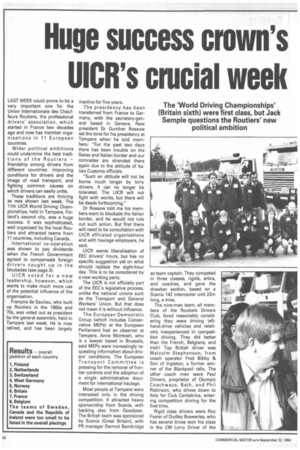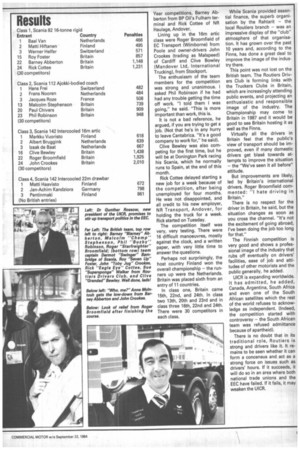Huge success crown's UICR's crucial week
Page 56

Page 57

If you've noticed an error in this article please click here to report it so we can fix it.
LAST WEEK could prove to be a very important one for the Union Internationale des Chauffeurs Routiers, the professional drivers' association, which started in France two decades ago and now has member organisations in 11 European countries.
Wider political ambitions could undermine the best traditions of the Routiers — friendship among drivers from different countries: improving conditions for drivers and the image of road transport; and fighting common causes on which drivers can easily unite.
These traditions are thriving as was shown last week. The 11th UICR World Driving Championships, held in Tampere, Finland's second city, was a huge success. It was sophisticated, well organised by the local Routiers and attracted teams from 11 countries, including Canada.
International co-operation was shown to pay dividends when the French Government agreed to compensate foreign drivers caught up in the blockades (see page 3).
UICR voted for a new leadership, however, which wants to make much more use of the potential influence of the organisation.
Francois de Saulieu, who built up Routiers in the 1960s and 70s, was voted out as president by the general assembly, held in Tampere last week. He is now retired, and has been largely inactive for five years.
The presidency has been transferred from France to Ger many, with the secretary-gen eral based in Geneva. New president Dr Gunther Rossow set the tone for his presidency at Tampere when he told members: "For the past two days there has been trouble on the Swiss and Italian border and our comrades are stranded there again due to the attitude of Italian Customs officials.
"Such an attitude will not be borne much longer by lorry drivers. It can no longer be tolerated. The UICR will not fight with words, but there will be deeds forthcoming."
Dr Rossow told me his members want to blockade the Italian border, and he would not rule out such action. But first there will need to be consultation with UICR affiliated organisations and with haulage employers, he said.
UICR wants liberalisation of EEC drivers' hours, but has no specific suggestion yet on what should replace the eight-hour day. This is to be considered by a new working party.
The UICR is not officially part of the EEC's legislative process, unlike the national unions such as the Transport and General Workers' Union. But that does not mean it is without influence.
The European Democratic Group (which includes Conser vative MEPs) at the European Parliament had an observer at Tampere. Anne McIntosh, who is a lawyer based in Brussels, said MEPs were increasingly requesting information about driv ers' conditions. The European Transport Committee is pressing for the removal of fron tier controls and the adoption of a single administrative document for international haulage.
Most people at Tampere were interested only in the driving competition. It attracted heavy sponsorship from Scania, with backing also from Goodyear.
The British team was sponsored by Scania (Great Britain), with PR manager Dermot Bambridge as team captain. They competed in three classes, rigids, artics, and coaches, and gave the drawbar section, based on a Scania 142 Intercooler unit 22m long, a miss.
The nine-man team, all members of the Routiers Drivers Club, fared reasonably considering they were driving lefthand-drive vehicles and relatively inexperienced in competition driving. They did better than the French, Belgians, and Irish! Top British driver was Malcolm Stephenson, from coach operator Fred Bibby & Son of Ingleton, a former winner of the Blackpool rally. The other coach men were Paul Chivers, proprietor of Olympic Coachways, Bath, and Phil Robinson, who drives down to Italy for Club Cantabrica, entering competition driving for the first time.
Rigid class drivers were Roy Foster of Dudley Breweries, who has several times won his class in the CM Lorry Driver of the
Year competitions, Barney Abberton from BP Oil's Fulham terminal and Rick Cottee of NR Haulage, Andover.
Lining up in the 16m artic class were Roger Broomfield of EC Transport (Wimborne) from Poole and owner-drivers John Crookes (trading as Malspeed) of Cardiff and Clive Bowley (Mandover Ltd, International Trucking), from Stockport.
The enthusiasm of the team members for the competition was strong and unanimous. I asked Phil Robinson if he had had any trouble getting the time off work. "I told them I was going," he said. "This is more important than work, this is.
It is not a bad reference, he argued, if you are trying to get a job. (Not that he's in any hurry to leave Cantabrica. "It's a good company to work for," he said).
Clive Bewley was also competing for the first time, but he will be at Donington Park racing his Scania, which he normally runs to Spain, at the end of this month.
Rick Cottee delayed starting a new job for a week because of the competition, after being unemployed for four months. He was not disappointed, and all credit to his new employer, NR Transport, Andover, for holding the truck for a week. Rick started on Tuesday.
The competition itself was very, very testing. There were 16 difficult manoeuvres, mostly against the clock, and a written paper, with very little time to answer the questions.
Perhaps not surprisingly, the host country Finland won the overall championship — the runners up were the Netherlands. Britain was placed sixth from an entry of 11 countries.
In class one, Britain came 15th, 22nd, and 24th. In class two 13th, 20th and 23rd and in class three 16th, 22nd and 24th. There were 30 competitors in each class. While Scania provided essential finance, the superb organisation by the Rahtarit — the local Routiers branch — was an impressive display of the "club" atmosphere of that organisation. It has grown over the past 10 years and, according to the Finns, has done a great deal to improve the image of the industry there.
This point was not lost on the British team. The Routiers Drivers Club is forming links with the Truckers Clubs in Britain, which are increasingly attending public events, and projecting an enthusiastic and responsible image of the industry. The Championship may come to Britain in 1987 and it would be good to see Britain hosting it as well as the Finns.
Virtually all the drivers in Britain feel that the public's view of transport should be improved, even if many domestic drivers get blasé towards attempts to improve the situation — the "We've seen it all before" attitude.
But improvements are likely, led by Britain's international drivers. Roger Broomfield commented: "I hate driving in Britain."
There is no respect for the driver in Britain, he said, but the situation changes as soon as you cross the channel. "It's not the excitement of going abroad, I've been doing the job too long for that."
The Finnish competition is very good and shows a professional image of the industry that rubs off eventually on drivers' facilities, ease of job and attitudes of other motorists and the public generally, he added.
UICR is expanding worldwide. It has admitted, he added, Canada, Argentina, South Africa and even one of the South African satellites which the rest of the world refuses to acknowledge as independent. (Indeed, the competition started with controversy — the South African team was refused admittance because of apartheid).
There is no doubt that in its traditional role, Routiers is strong and drivers like it. It remains to be seen whether it can form a concensus and act as a strong force on issues such as drivers' hours. If it succeeds, it will do so in an area where both national trade unions and the EEC have failed. If it fails, it may weaken the UICR.




























































































